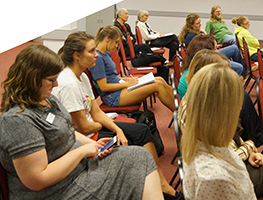
| Childhood Victimization, Poly-Victimization, and Psychological Distress in College-Aged Males |
| 2014 symposium presentation by: Rachel Turk, Brianna Pomeroy, Brittany Nipper, Marco Pomposini and Lora Wagner |
Dr. Ann Elliott




Abstract. This correlational study examines the relationships
among poly-victimization (i.e., high cumulative levels of victimization), six aggregate categories of childhood victimization (property crime,
cumulative levels of victimization), six aggregate categories of childhood victimization (property crime,
 physical assault, peer/sibling, witnessed/indirect, sexual, child maltreatment), and psychological distress in 153 male
undergraduate students attending a southeastern U.S. university. Using hierarchical regression, the first question addressed in this study
concerns the relative contributions of poly-victimization and individual
categories of childhood victimization in predicting psychological
distress, as measured by the Symptom-Checklist-90-revised and the Trauma
Symptom Inventory-2. Second, the study examines whether
physical assault, peer/sibling, witnessed/indirect, sexual, child maltreatment), and psychological distress in 153 male
undergraduate students attending a southeastern U.S. university. Using hierarchical regression, the first question addressed in this study
concerns the relative contributions of poly-victimization and individual
categories of childhood victimization in predicting psychological
distress, as measured by the Symptom-Checklist-90-revised and the Trauma
Symptom Inventory-2. Second, the study examines whether
 poly-victimization contributes any significant variance, beyond that
accounted for by the combination of all six aggregate categories.
Preliminary regression analyses revealed that a) poly-victimization
accounts for a significant proportion of variability in scores for
psychological distress, beyond that accounted for by any of the six
categories of childhood victimization alone, and b) the categories of
childhood victimization contribute little to no variability beyond that
accounted for by poly-victimization. Findings emphasize the importance
for clinicians and researchers to comprehensively assess multiple
categories of childhood victimization and poly-victimization when
evaluating a client’s psychological adjustment.
poly-victimization contributes any significant variance, beyond that
accounted for by the combination of all six aggregate categories.
Preliminary regression analyses revealed that a) poly-victimization
accounts for a significant proportion of variability in scores for
psychological distress, beyond that accounted for by any of the six
categories of childhood victimization alone, and b) the categories of
childhood victimization contribute little to no variability beyond that
accounted for by poly-victimization. Findings emphasize the importance
for clinicians and researchers to comprehensively assess multiple
categories of childhood victimization and poly-victimization when
evaluating a client’s psychological adjustment. |
|||
|
|||
| last update: May 28th 2014 Radford University ~ Radford, Virginia webpage: w.andrew |